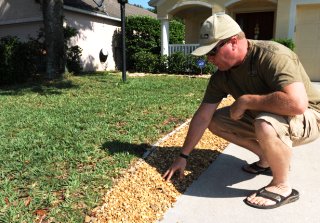|
Article Courtesy of The Bradenton Herald By Sabrina Rocco Published May 27, 2014
LAKEWOOD RANCH -- A homeowners association has temporarily halted a decision to force a resident to remove a gravel and sand path designed to protect his epileptic stepson from a serious fall.
Michael Groves says he installed the path three years ago so his 15-year-old stepson could safely traverse up and down the driveway without stepping foot on concrete. Groves and his wife, Laura, fear the possibility of their son suffering an epileptic episode on concrete and cracking his head open or even dying. The path, made of pea gravel and sand, is constructed to disperse the energy of a fall, Groves says.
After a Herald story published April 30, the board sent a letter to Michael Belle, Groves' attorney, on May 9 stating that the decision is temporarily overturned under one condition: Groves must provide a recommendation from a physician stating that gravel and sand is, indeed, a better cushion than concrete.
"The HOA realizes that they are in a world of hurt, and now they are trying to follow all the steps they can to make up for it," Belle said. "Although they are legally allowed to request information, it seems a little overbearing ... they're forcing Mike Groves to put his son's condition on record, when he was hoping the board would just acknowledge the fact that he has a disabled stepson."
Robert Swiatek, association president, declined to comment and referred questions to the board's attorney. Attorney Stephen Thompson did not respond to specific questions about the case.
SRVA produced a document titled "Reasonable Modification Request" that Groves must fill out and return with a physician's signature. Groves contends the document, which is not listed online under the forms section of SRVA's convenants, was likely created last minute to provide HUD with documentation that SRVA is complying with federal law.
"I'm feeling angry that they are trying to backtrack and trying to cover their tracks by making up forms that don't exist," Groves said, adding that he is complying with the requirement. Groves gave the paperwork to his son's physician Wednesday.
Proving the efficiency of gravel and sand may not require the extra steps requested by SRVA.
According to the Public Playground Safety Handbook released by the United States Consumer Product Safety Commission, pea gravel and sand are among the list of materials recommended for surfacing playgrounds. Of the items not recommended: concrete and asphalt.
"A fall onto a shock absorbing surface is less likely to cause a serious head injury than a fall onto a hard surface," the handbook says. |
